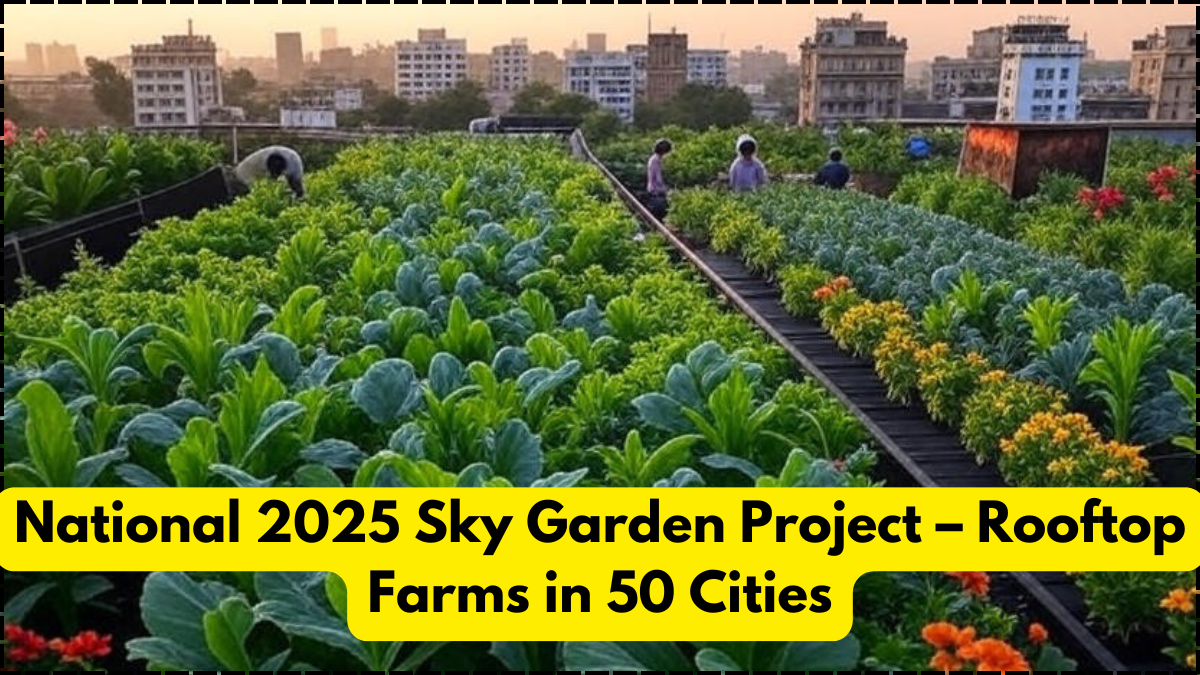Sky Garden Project India 2025 is one of the most ambitious green initiatives of the year, aiming to transform city skylines into productive green spaces. By promoting Urban Rooftop Farming, the project will turn unused and underutilized rooftops into thriving farms across 50 cities in India. This initiative is designed to tackle food security, improve urban air quality, and encourage sustainable living.
Rooftop farming is not a new concept, but with Sky Garden Project India 2025, the scale and planning have reached new heights. The goal is to make every city rooftop a contributor to fresh produce supply while fostering community involvement in eco-friendly practices.

How the Sky Garden Project Works
The program follows a well-structured model to ensure rooftop farms are both productive and sustainable. City municipal bodies, housing societies, and private building owners can register their rooftops for conversion.
Key operational elements include:
-
Providing starter kits with soil, seeds, and irrigation systems.
-
Offering training sessions on Urban Rooftop Farming techniques.
-
Regular monitoring by agricultural experts to maintain quality.
-
Partnerships with local vendors for distribution of surplus produce.
By combining government support with citizen participation, Sky Garden Project India 2025 aims to make farming accessible even in dense urban settings.
Benefits of Urban Rooftop Farming
Implementing Urban Rooftop Farming brings a host of benefits to individuals, communities, and the environment.
| Benefit Area | Description | Impact Level |
|---|---|---|
| Food Security | Fresh produce grown locally | Reduces dependency on imports |
| Air Quality | Plants absorb CO₂ and release oxygen | Improves health outcomes |
| Temperature Regulation | Rooftops act as green insulation | Lowers urban heat island effect |
| Economic Opportunities | Sell surplus produce to local markets | Boosts income for participants |
| Community Engagement | Shared farming spaces encourage social bonds | Strengthens local networks |
These benefits make Sky Garden Project India 2025 not just an environmental policy but also an economic and social improvement strategy.
Environmental Impact
The large-scale implementation of Urban Rooftop Farming can significantly improve urban sustainability. By covering thousands of square meters of concrete rooftops with greenery, cities will see a reduction in heat retention, leading to cooler surroundings. It also reduces rainwater runoff and promotes biodiversity in otherwise barren city landscapes.
Moreover, rooftop farms help reduce the carbon footprint by minimizing the transportation of fresh produce from rural areas to cities. With the Sky Garden Project India 2025, every rooftop becomes a small but vital part of a national climate action effort.
Challenges and Solutions
While the vision is exciting, practical challenges exist in rolling out the Sky Garden Project India 2025.
-
Space limitations: Addressed by using vertical farming methods on rooftops.
-
Maintenance issues: Solved through community-led care and regular training sessions.
-
Cost concerns: Subsidies and low-interest loans will make Urban Rooftop Farming affordable for more participants.
Through careful planning and strategic partnerships, these hurdles can be overcome to ensure the long-term success of the project.
Conclusion
Sky Garden Project India 2025 represents a shift toward a greener, healthier, and more self-reliant urban lifestyle. By embracing Urban Rooftop Farming, cities can contribute to food security, environmental improvement, and community cohesion. This project has the potential to change the way we think about urban spaces and inspire similar initiatives around the world.
FAQs
What is the goal of Sky Garden Project India 2025?
The main goal is to promote Urban Rooftop Farming in 50 cities, turning unused rooftops into productive green spaces.
Who can participate in the project?
Any building owner, housing society, or municipal body with suitable rooftop space can join.
What crops can be grown on rooftops?
Participants can grow vegetables, fruits, herbs, and even small flowering plants.
How will the government support participants?
The government will provide starter kits, training, and subsidies to encourage participation.
Will rooftop farming reduce electricity costs?
Yes, green rooftops provide insulation, which can lower indoor temperatures and reduce air conditioning use.
Click here to learn more